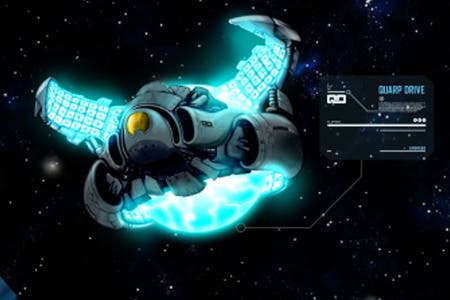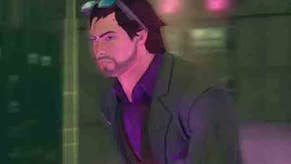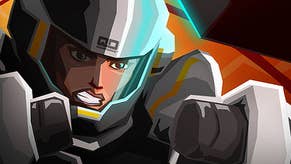Velocity Review
Scream if you wanna shoot faster.
Sometimes, what looks like a frame turns out to be part of the picture. So it is with Velocity, which starts off as a scrolling shooter but soon blooms into something more akin to a puzzler. And following on from Floating Cloud God Saves the Pilgrims, it's another great PlayStation Mini - at last, that rather flat marketplace is gaining some momentum.
And speeding up is what the splendidly-named Quarp Jet, your dinky spaceship, is all about. Velocity's more complex abilities are kept back for a while, with the early stages built around the ability to speed up how fast the screen's scrolling - holding R roughly doubles the ship's pace, with a neon exhaust trail for the kids. Rapid-fire shooting and high speeds are all well and good, but you also have to be constantly hoovering up the survivor pods that dot each stage. Then things start to get trickier.
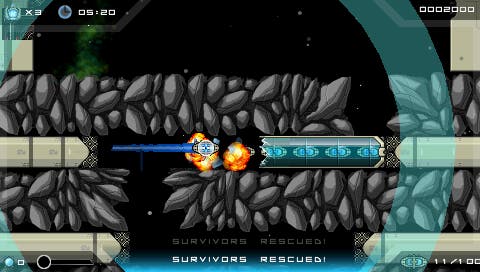
Velocity's first twist is a teleport. Hold the square button and control is switched from the ship to a reticule; put it where you want to go and release for an insta-switch. This wouldn't work nearly so well if the Quarp Jet wasn't able to bash off the side of walls (though being crushed at the bottom of the screen still means death), as the switch between controls often left me overshooting after popping out at the other end. As it is, the short hops are quickly mastered and you're soon materialising in the middle of enemy swarms with guns blazing, blinking out of certain-death situations, and navigating through sealed sections of the level like a pro.
The whole production is soaked in the aesthetics of '80s coin-ops, particularly Galaga, and this is one of Velocity's more varied achievements. The music is superb throughout: pulsing chiptunes that channel the old high-score rhythms in short, looping onslaughts. The retro visual style also hits the nostalgia button, but never feels like it does anything particularly special with it - the sprites and environments are authentic enough, but there's nothing standout, no little flourishes. This period feel is clearly what Velocity is going for, and it succeeds, but a totally faithful '80s shooter aesthetic is hard to get excited about.
It's a curious tension, because as Velocity unfolds it's clearly much more than just an '80s shooter. There's a remarkable amount of incidental content, much more than you'd expect from a download game, with the 'ship computer' on the main menu hosting versions of Minesweeper and Snake alongside backstory details, challenge levels unlocked by picking up out-of-the-way trophies, an art gallery (after finishing the main game) and a calculator for inputting cheat codes. It's more about fiddling than adding substantial depth, but it's an exceptionally fleshed-out distraction.
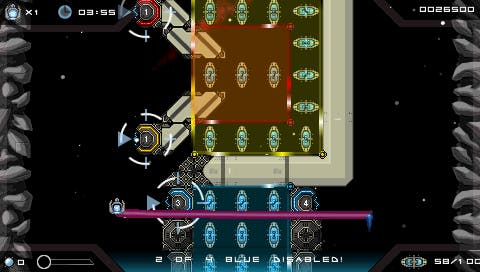
Back to shooting aliens, lest we forget that's what it's all about. Velocity has one more mechanic after teleporting, and almost everything changes when it's introduced. Your ship can drop permanent markers in a level (up to a maximum of five), which can be warped back to at any point. This is Velocity's license to pump up both the scale and intricacy of its environments. The majority of levels from here on in have to be replayed as they're being played - that is, you'll be dropping these 'telepods' at every fork in the path and zipping back and forth through the level to trigger gates in the right order and rescue previously trapped survivors.
Velocity's appeal isn't in the shooting so much as the emerging structure of its levels, which change from straightforward alien corridors into labyrinths of sealed rooms and numbered switches. Survivors or routes will often be blocked off by coloured energy fields that have to be deactivated by finding and destroying switches, but these will be dotted around and about the entire length of the level. You quickly twig that the best way to play is one big run-through at the start, dropping waypoints, before perusing the map and picking re-entry points to tie up all of the apparatus. A word, too, for the humble map, which notes switches and their place in the sequence as a matter of course, minimising the time wasted on dead ends.
Velocity has many disparate elements up until this point, but the telepods pull them all together. Completing levels is simple, but achieving a decent score is the challenge, with enemy and switch set-ups that just beg to be dealt with in a series of pointed swoops, going from long-range teleports to bomb-dropping carnage in an instant. It's a unique kind of glue, turning what you'd normally characterise as replay value into the front-and-centre attraction. Plus, warping into the midst of a giant defence perimeter to drop a pile of explosives and boost out really doesn't get old.
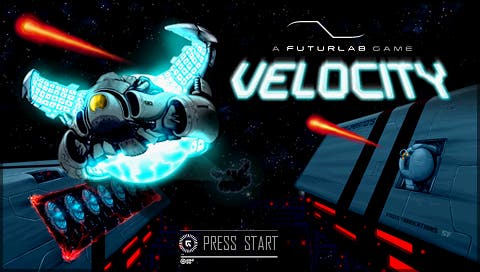
This goes hand-in-hand with a medal system that takes into account your completion time and the number of survivors rescued, rewarding you with XP that ties into how the levels unlock (not especially noticeable, but a nice touch nevertheless). Rare yellow pods are also scattered around, each of which unlocks a fiendish side-mission, and the increasingly elaborate environments are used to very sneaky effect in hiding them. With these 20 missions on top of the campaign's 50, that's a hell of a lot of bang for £3.99.
Velocity is a good game that is just that tiny fraction away from greatness. Why? Well the boost effect could feel a bit more... boost-y. Faster. The shooting could be more pyrotechnic or challenging. The teleport mechanic could even be semi-automated without it losing much. But these imperfections are the price of a game that's not just absolutely crammed with ideas but manages to pull them together.
Velocity looks like a blast from the past and plays like anything but; it's some sort of triumph of substance over style. That sounds like a good thing, and it is, but a little more of the latter wouldn't have hurt.
